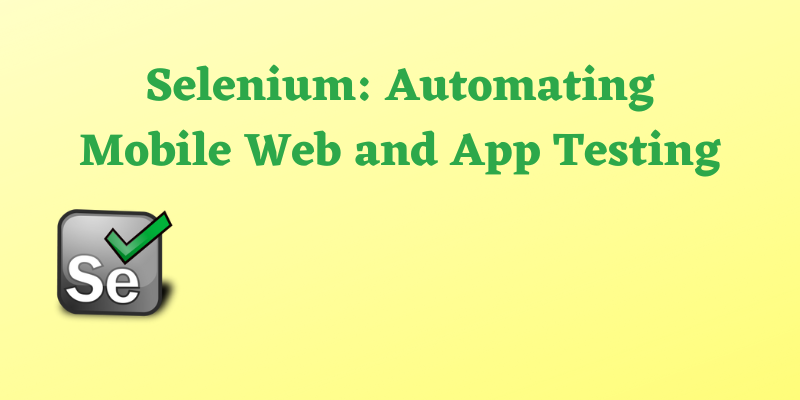Selenium: Automating Mobile Web and App Testing
Selenium is a framework for automating browsers. It offers several tools and APIs to automate user interaction on pure HTML and JavaScript applications in browsers like Internet Explorer, Mozilla Firefox, Google Chrome, Safari, etc. Silverlight, Flex, Flash, and JavaFX are rich internet application (RIA) technologies that Selenium does not support. If you want to gather more detailed information about Selenium: Automating Mobile Web and App Testing, Join Selenium Training in Chennai at FITA Academy to gain knowledge from basics to advanced levels from our expert trainers.
Steps for Automating Mobile App and Web Testing:
Understanding the Challenges of Mobile Testing
Due to the more variety of mobile devices, operating systems, and screen sizes, mobile testing presents particular difficulties. To ensure compatibility, functionality, and user experience across many platforms, testing mobile web applications and native mobile apps requires a comprehensive methodology. These issues can be overcome by automating mobile testing with Selenium and Appium, resulting in effective and trustworthy testing procedures. Excited to learn more? Enrol now at the Selenium Training in Bangalore.
Selenium WebDriver for Mobile Web Testing
A well-liked automation framework called Selenium WebDriver can be used for testing mobile websites. You can interact with mobile web browsers using Selenium and carry out tasks like clicking on items, filling out forms, and checking the content of web pages. You may use Selenium WebDriver’s rich features for automating mobile web testing jobs because it has a comfortable programming interface. You can perform consistent and accurate testing across various mobile devices and browsers using Selenium.
Why is Selenium the most Supported in Automation Testing? Selenium stands out due to its open-source nature, cross-browser compatibility, and strong community support. It supports multiple programming languages like Java, making it a top choice for automated testing. With robust integration capabilities and frequent updates, Selenium remains the most widely adopted tool for automation testing.
Appium for Native Mobile App Testing
An open-source automation framework called Appium was created exclusively for automating the testing of native mobile apps. You may create test scripts using common programming languages like Java, Python, or JavaScript because it supports Android and iOS platforms. You can build code that works flawlessly across many devices and operating systems thanks to Appium’s universal API, which abstracts away the underlying mobile platforms. To ensure thorough testing of your mobile applications, use Appium to automate interactions with native app features, carry out gestures, and evaluate app behaviour.
Setting Up the Mobile Testing Environment
The necessary setup is required before beginning mobile testing using Selenium and Appium. To support communication between the automation framework and the mobile devices or emulators/simulators, this entails installing the necessary drivers, such as Appium Server. Additionally, setting up the SDKs, development environment, and required dependencies allows a seamless testing process. With the right configuration, Selenium and Appium may be used to automate mobile web and app testing with ease. For online and offline courses, check out the Selenium Training in Marathahalli.
Writing Effective Test Scripts for Mobile Testing
Writing simple and succinct test scripts is essential for automating mobile testing effectively. This entails detecting mobile-specific features, like buttons, text fields, or dropdowns, and interacting with them using the proper locators. Additionally, you’ll deal with mobile-specific situations like rotating screens, managing notifications, or using device-specific features like the camera or GPS. Your mobile test suite may be easily maintained and scaled thanks to the creation of modular and reusable test scripts.
Enroll in Selenium Online Training to get trained by our professional trainers at your Flexible time.
Overcoming Mobile Testing Challenges
Testing for mobile devices presents unique difficulties, such as adjusting to various screen sizes, resolutions, and orientations. Designing test cases that consider these variations and provide consistent user experiences across devices is crucial. Additionally, network issues like sluggish or inconsistent connections might affect the usefulness and performance of an app. Testing under various network situations ensures the best app behaviour, which helps spot potential problems. You can raise the calibre and dependability of your mobile applications by solving these issues.
Integrating Mobile Testing in CI/CD Pipelines
It would help to incorporate mobile testing into your continuous integration, which usually delivers (CI/CD) pipelines to achieve timely and effective testing. You can smoothly incorporate mobile testing with your current CI/CD procedures by automating it with Selenium and Appium. As a result, mobile test suites may be executed automatically, bugs can be found earlier, and feedback loops can move more quickly. Continuous testing is encouraged by integrating mobile testing with CI/CD pipelines, which also makes it possible to release mobile applications frequently and with confidence.
Final Words:
In this blog, you will have understood detailed information about Selenium Mobile and Web App Testing. To become an expert in testing, Join the Training Institute in Bangalore and start your career in the testing field.

